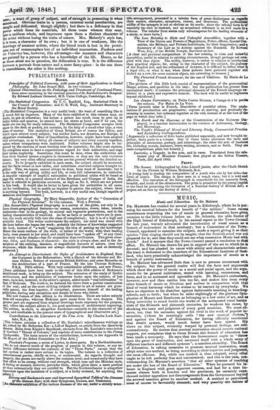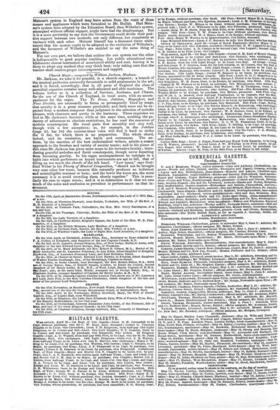MITSIC.
Music and Edsoation. By Dr. Mainzer.
Da. MAINZER has resided for several years in Edinburgh, where he is pur- suing his musical labours for the benefit of "the million." Some recast occurrences respecting the use of music in general education have gisua occasion to the little volume before us. Dr. Schmitz, the able Rectos Eff the High School of Edinburgh, in his annual report to the Town-Council
for last year, warmly advocated the introduction of vocal music as .a branch of instruction in that seminary; but a Committee of the Town- Council, appointed to examine the subject, made a report giving it as their opinion "that singing should not be taught; that the Scottish mind was not prepared for it; and that theycould not see what connexion Music had with Greek." And it appears that the Town-Council passed a resolution to•thak effect. Dr. Mainzer has drawn his pen in support of the art to which he is devoted; and has pleaded its cause with ability and characteristic ardour. His tract is dedicated to the members of the Educational Institute of Scot- land, who have practically acknowledged the importance of music as a branch of public instruction.
Dr. Mainzer has advanced little that is new to persons conversant with the subject; but the general reader will find the fads and arguments which show the power of music as a moral and social agent, and the argu- ments for its general cultivation, stated with learning, earnestness, sad force, and in an animated and agreeable style. Dr. Mainzer's enthusiasm, however, now and then carries him too far, and makes him treat every other branch of music as frivolous and useless in comparison with that kind of vocal harmony which he wishes to be learned by everybody. We have no objection to his diatribes against fashionable teaching in boarding- schools, and so forth; but when he talks slightingly of the glorious Sym- phonies of Mozart and Beethoven as belonging to a low order of art, and as being unworthy to stand beside the works of the antiquated vocal harmo nista of the fifteenth and sixteenth centuries, he weakens his cause, by shocking the taste and judgment of every good musician. We must ob- serve, too, that his sarcasms against his rival in the work of popular in- struction, (whom he sneeringly calls "the new muskal Joshua,") and against the Board of Education, for having officially sanctioned that rival's system, would much better have been spared. His views on this subject, evidently warped by personal feelings, are self- contradictory. He desires that musical instruction should receive national support, yet complains that in Great Britain this branch of education has been made a monopoly. He says that the Government ought to "throw open the gates of instruction, and surround itself with a whole army of different teachers and different systems"; a manifest absurdity. The Board of Education, in taking measures to promote musical instruction, must adopt some one method, as being, according to their inquiries and judgment, the most efficient. But, while one method is thus adopted, every other ought to be left perfectly free and unrestrained; and this is the case, not- withstanding Dr. Mainzer's assertion "that all other systems of teaching are under the ban of the Board of Education." When he pursued his la- bours in England with great apparent success, and had for a time im- mense classes both in London and the provinces, he certainly expe- rienced neither opposition nor discouragement from the Government beyond the avowed sanction given to another method. A method so patronized must of course be favourably situated; mut very possibly .tho failure of Mainzer'', system in England may have arisen from the want of those means and appliances which were furnished to Mr. Hallah. Had Main- zer's system been adopted by the Education Board, then Wilhelm's system, attempted without official support, might have had the disadvantage. But it is a mere perversity to say that the Government could divide their posi- tive support between two methods, not only different, but completely at variance with each other. bfainzer himself has a thousand times main- tained that his system ought to be adopted to the exclusion of Wilhelm's; and the favourers of Wilhelm's are entitled to say the same thing of Mainzer's.
For our own part, we believe that neither the one system nor the other is indispensable to good popular teaching. Let public educational esta- blishments choose instructors of ascertained ability and zeal, leaving it to them to adopt any method they may think best; only taking care that the teacher shall receive proper encouragement and support.



























 Previous page
Previous page